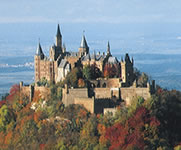Other highlights
Contact
Kongress- und Tourismuszentrale Bayreuth
Luitpoldplatz 9
95444 Bayreuth
Email:
[email protected]
Internet:
www.bayreuth-tourismus.de
Luitpoldplatz 9
95444 Bayreuth
Email:
[email protected]
Internet:
www.bayreuth-tourismus.de
Places of interest

The Margravial Opera House is said to be Europe's most beautiful intact baroque theatre. It was built for Margravine Wilhelmine by Giuseppe Galli Bibiena and his son Carlo, from the famous Bolognese family of theatre designers. In 1871 the stage, which measures 27 metres from front to back, was still the biggest in Germany – and it was this that first attracted Richard Wagner to Bayreuth.
Home of the margraves of Bayreuth. The New Palace, built in 1753 by architect Joseph St. Pierre, has many fine Bayreuth Rococo features, such as the Garden Room and Palm Room, Wilhemine's Music Room and the famous Cabinet of Fragmented Mirrors.
The Hermitage (Eremitage), an historical park outside the town - once a refuge from court life - contains the Old Palace with its Inner Grotto, fountains and a fairytale orangery with central sun temple crowned by Apollo, leader of the muses.
Travel Planner
Select an option...



